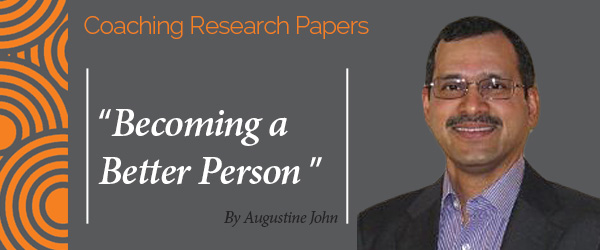Research Paper By Augustine John Serrao
(Executive Coaching, INDIA)
Becoming a Better Coach
Off late one of the things I have been delving into is the complete framework of the ICF competencies. There are 11 of them. As I read the version on the ICF website I did get some sense of what they were all about. In my search I got a more detailed document (click the pdf here) that catapulted my deep dive to a higher level. As I reflected on them particularly at the highest level of the MCC certification, I was dumbstruck to see the expectations in terms of a passing score at that level. I resolved to fully explore to gain greater insights into each of them. During my peer coaching sessions especially as I got coached, I quickly ran out of coaching topicsJ. I realized that I could use these peer coaching sessions to be coached around the ICF competencies.
I started first with the 2nd ICF competency of:
2. Establishing the Coaching Agreement
Ability to understand what is required in the specific coaching interaction and to come to agreement with the prospective and new client about the coaching process and relationship.
- Understands and effectively discusses with the client the guidelines and specific parameters of the coaching relationship (e.g., logistics, fees, scheduling, inclusion of others if appropriate).
- Reaches agreement about what is appropriate in the relationship and what is not, what is and is not being offered, and about the client’s and coach’s responsibilities.
- Determines whether there is an effective match between his/her coaching method and the needs of the prospective client.
Where the waters do agree, it is quite wonderful the relief they give.
Jane Austen, Emma
As I worked through my coach some of my ‘aha’ moments were:
- Exploring measures of success to help client achieve clarity about intent and direction
- Periodically checking with the client whether movement during the coaching is in the intended direction
As I reflected on these discoveries for myself, I realized that something like this could also be part of my personal interactions whether they are professional or purely personal interactions. I especially liked the second one of periodically checking if the conversation is going on in the intended direction. This is very much applicable in a professional conversation as sometimes we tend to meander. Establishing clear cut guidelines of what to focus on during the next 45 minutes of say our meeting, can in fact make those meetings very productive. This will certainly make me a better and more productive person.
I next decided to probe the 1st ICF competency on:
1. Meeting Ethical Guidelines and Professional Standards
Understanding of coaching ethics and standards and ability to apply them appropriately in all coaching situations.
- Understands and exhibits in own behaviors the ICF Standards of Conduct (see list, Part III of ICF Code of Ethics).
- Understands and follows all ICF Ethical Guidelines (see list).
- Clearly communicates the distinctions between coaching, consulting, psychotherapy and other support professions.
- Refers client to another support professional as needed, knowing when this is needed and the available resources.
Ethics and Standards is about understanding and meeting coaching ethics and standards. Fundamentally it is about doing the right thing as espoused in our scriptures. For eg. I take recourse to a passage in scripture in the Bible in Luke 6:31
As ye would that men should do to you, do ye also to them likewise.
This passage sums up in many ways all that is there in the Ethical Guidelines and Professional Standards. As I reflected this with my peer coach, this became very clear to me.
The biggest obstacle to people becoming better is that you have to really want to be a good person in order to be a better person, and most people would rather be other things.
Dennis Prager
In trying to uphold these guidelines, regardless of our religious orientation we will become better people. I personally believe that it is difficult to divorce our professional coach lives from our personal lives. As we internalize these guidelines and practice them we are truly on the path to becoming better people.
